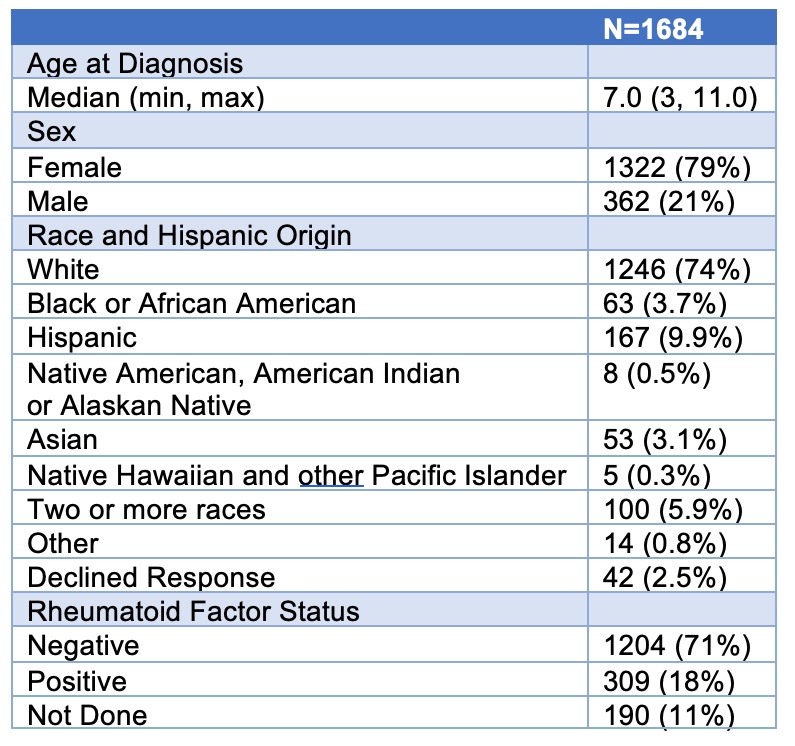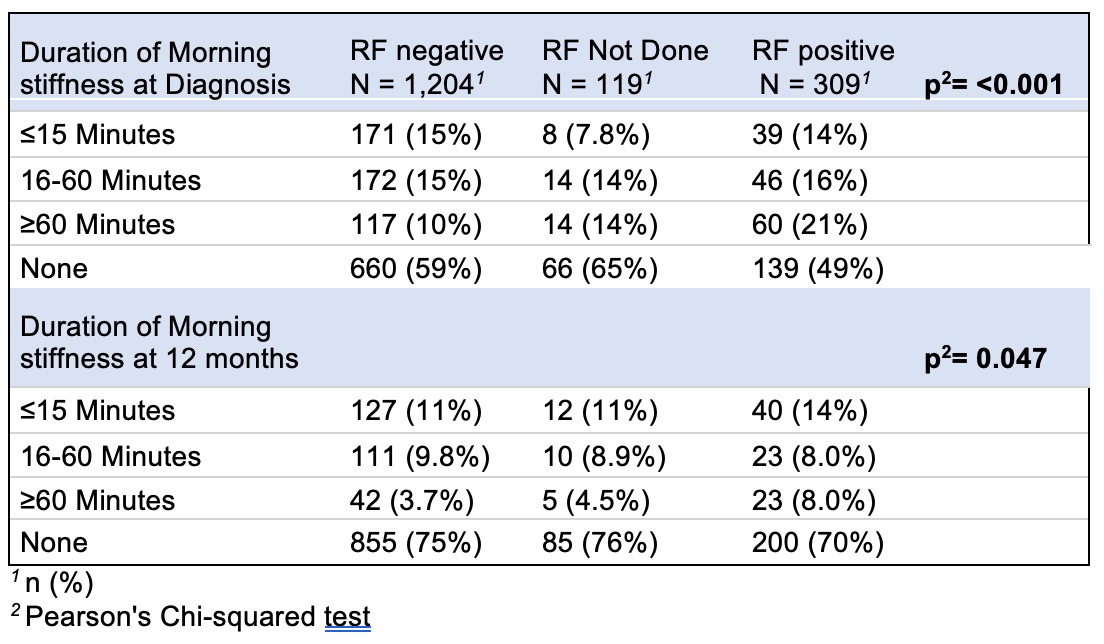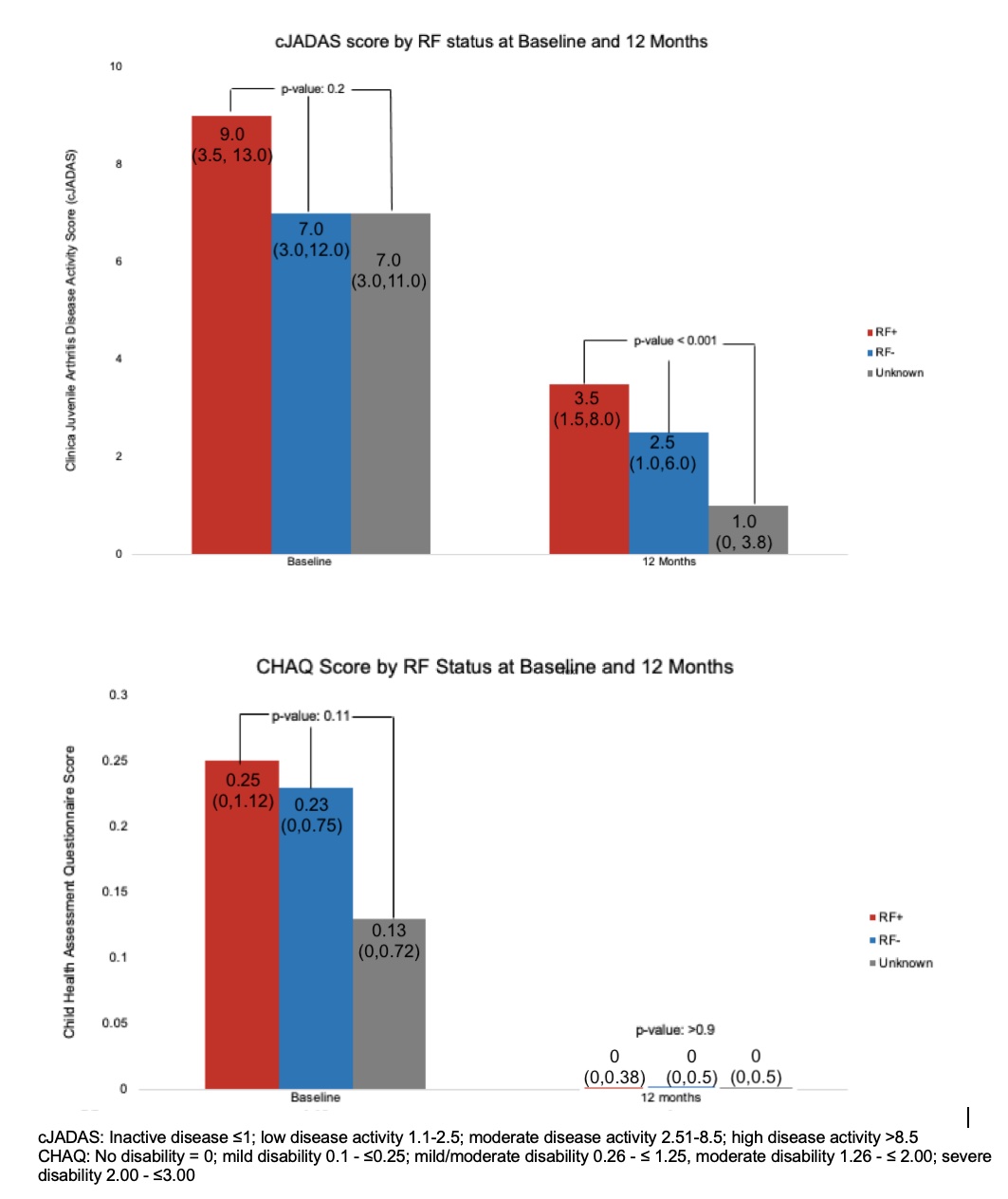Session Information
Session Type: Poster Session A
Session Time: 8:30AM-10:30AM
Background/Purpose: Children with rheumatoid factor (RF) positive polyarticular JIA (pJIA) are less likely to go into remission and more likely to develop erosive disease than those with RF negative pJIA. Differences in disease activity and disability over the first year of diagnosis between RF+ versus RF- pJIA have not been described in the new Childhood Arthritis and Rheumatology Research Alliance (CARRA) Registry. In this study, we investigate the differences in disease activity and disability by RF status at time of diagnosis and at 12 months among pJIA patients enrolled in the new CARRA Registry.
Methods: We analyzed data from the CARRA Registry collected from July 2015 through February 2020. Inclusion criteria were USA residency and pJIA diagnosis with recorded >4 joints involved in first 6 months of disease, and exclusion criteria was additional diagnosis of other autoimmune disease. Groups were categorized by RF status (positive, negative, or unknown). Duration of morning stiffness was collected and categorized as none, ≤15 minutes, 15-60 minutes, ≥60 minutes, or unknown. Disease activity was assessed with the Clinical Juvenile Arthritis Disease Activity (cJADAS). The Child Health Assessment Questionnaire (CHAQ) scores were collected to assess functional disability. Pearson’s chi-squared test used to analyze differences in morning stiffness by RF status at baseline and 12 months. Kruskal- Wallis testing was used to assess differences in disease activity and disability by RF status at baseline and 12 months.
Results: 1684 patients were included in the study. The majority of patients (71%) were RF negative, 18% were RF positive (Table 1). At diagnosis and 12-month visits, RF+ patients had a longer duration of morning stiffness (Table 2,p=< .001, and p< .047, respectively). RF+ pJIA patients had high disease activity (median cJADAS=9, 3.5-13) while RF negative and RF unknown patients had moderate disease activity (Figure 1). There was no statistical difference in cJADAS (p=.2) or CHAQ (p=.11) by RF status at diagnosis. By 12 months, all groups’ cJADAS improved, but RF positive patients had a statistically significant higher activity score compared to RF negative or RF unknown patients (p< .001). Despite these clear differences in disease activity, all RF status groups had a CHAQ median score of 0 or no reported disability (p=0.9) at the 12-month visit.
Conclusion: In our unadjusted model, all pJIA patients demonstrated improvement of disease activity as measured by cJADAS and disability as measured by CHAQ during the first year of enrollment in the CARRA registry. However, at the 12-month visit, RF positive patients reported longer duration of morning stiffness duration and a statistically significant higher cJADAS score as compared to other RF groups. Additional studies are needed to assess modifiable factors contributing to this difference in long term disease activity.
To cite this abstract in AMA style:
Balmuri N, Soulsby W, Cooley V, Gerber L, Lawson E, Onel K. Rheumatoid Factor Status as a Predictor of Disease Activity and Disability:An Analysis of the New CARRA Registry Polyarticular Juvenile Idiopathic Arthritis Cohort [abstract]. Arthritis Rheumatol. 2021; 73 (suppl 9). https://acrabstracts.org/abstract/rheumatoid-factor-status-as-a-predictor-of-disease-activity-and-disabilityan-analysis-of-the-new-carra-registry-polyarticular-juvenile-idiopathic-arthritis-cohort/. Accessed .« Back to ACR Convergence 2021
ACR Meeting Abstracts - https://acrabstracts.org/abstract/rheumatoid-factor-status-as-a-predictor-of-disease-activity-and-disabilityan-analysis-of-the-new-carra-registry-polyarticular-juvenile-idiopathic-arthritis-cohort/



